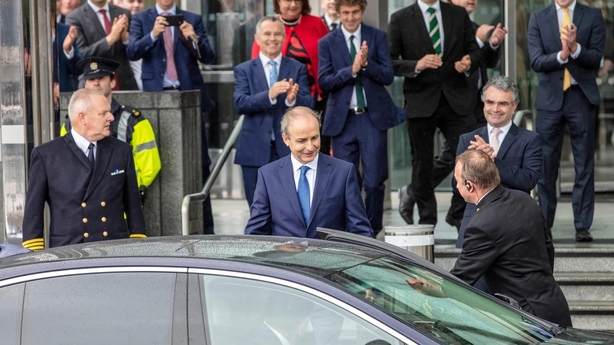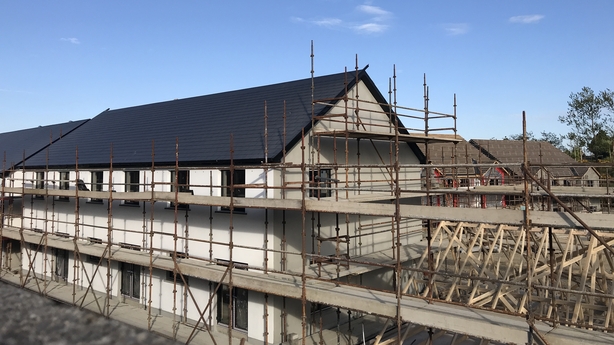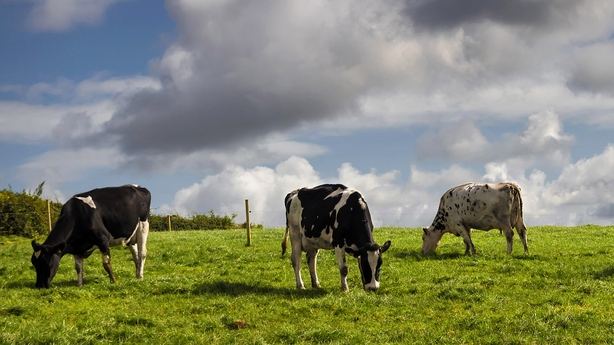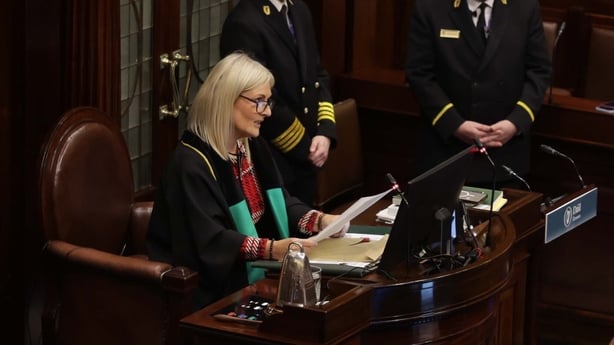When Micheál Martin is nominated as taoiseach in the Dáil on Wednesday, it will be a lot different to the last time.
Back in 2020, the vote took place in an echoing Convention Centre where he sat alone awaiting the outcome, because of social distancing rules in place at the time due to the Covid-19 pandemic.
His colleagues could not shake his hand, and his family could not travel from Cork. There wasn't even the chance of a haircut for the big occasion.

This week, all going to plan, the politician once described as the first Fianna Fáil leader never to be taoiseach, will take up the office for a second time.
The surroundings, not to mind the atmosphere, will be a lot different. Unlike last time, this will not be a time of national crisis.
But there will still be a sense of uncertainty prevailing, as he takes up the role two days after Donald Trump is inaugurated as president of the United States.
For Fine Gael too, Wednesday will bring a sense of relief. A fourth stint in government is not something that many in the party would have banked on during many points of the previous Dáil term.
Although it won't be the largest party, it will have three more TDs than it did in the outgoing administration: Simon Harris will be Tánaiste and is on course to take over for a second stint as Taoiseach in November 2027.
Trepidation around what lies ahead, what a Trump term will mean for Ireland and the EU, the economic impact of a potential trade shock and uncertainty around the future reliability of the country’s corporate tax take, drove a desire to form as stable a government as possible.
"The economic model which we rely on, based on a strong enterprise economy, free trade, competitiveness, and innovation, is facing new headwinds which we must prepare for," the Programme for Government - agreed between both parties and a number of independents, warns.
"The positive, global economic environment, which has benefited Ireland for many years, is no longer guaranteed."
For many who queried why nine Independents were brought into the coalition fold, the answer lies in the need to have a government that is solid enough to withstand what might come.
Such uncertainty is also likely to be behind what has been criticised as a level of vagueness in the policy commitments the Programme for Government contains.
Spending commitments and distinct timelines are avoided.
This has been a trend with programmes for government in recent times - particularly as they are more frequently a compromise between a number of distinct participants.
When it takes its place officially on Wednesday, this government will be faced with many of the same old problems of housing, public services particularly in health and disability, and inadequate public infrastructure.
On housing, there is unlikely to be any shift in direction.

The Programme for Government largely sticks with the plan of the last coalition. And while there are some new initiatives, nothing by way of new innovations.
The opposition will no doubt be keeping the coalition on its toes when it comes to housing.
Fianna Fáil, which is likely to retain the brief, believes that its plan is beginning to bare fruits and progress is being made.
Disability was a central theme of the election campaign and is likely to stay to the forefront of Dáil debate.
Any improvements in this area are likely to be outlined in a new National Disability Strategy which the Programme for Government has promised to publish.
There are plans to cut the waiting times for assessments of need. But apart from hiring more therapists, there is not much in the programme that would give families waiting a long time for these assessments much hope.
This is likely to be a recurring theme in Dáil questions.
On disabilities, the government has promised to publish and fund a new National Disability Strategy, "setting out a vision to 2030". A "national implementation and monitoring committee" with enhanced political oversight will be set up to ensure the delivery of the strategy.
An area where there is a big ambitious promise is childcare.
The incoming administration want to "progressively" cut it to €200 per month per child. This would be done through the national childcare scheme, but again timelines are vague.
One range of polices that will make this government different to the last is around climate.
Yes the Programme for Government wants to forge ahead, having already committed to carbon tax increases, and maintain the emission reduction targets set by the previous administration.
But there is a nod to farmers with a pledge to advocate at EU level to "reclassify biogenic methane" - in other words to see if the emissions coming from cattle can be counted differently in the overall carbon count.

The document also says the government will "allow data centres to contribute to economic growth and efficient grid usage." And it says the government will "take necessary action to ensure and protect Ireland’s energy security."
This is seen as opening the door to the liquefied natural gas facility in the Shannon landbanks in north Kerry - something the Healy-Raes had advocated for, yet the Greens had opposed.
The opposition in the forthcoming Dáil will look different too. It will predominantly be made up of left wing voices - the Labour Party, Social Democrats and Sinn Féin, meaning this Dáil is more likely than the last to be divided along ideological or centre left versus centre right lines.
The opposition will also include what's being called The Independents and Smaller Parties Technical Group.
Its members are the three PBP-Solidarity TDs: Richard Boyd Barrett, Ruth Coppinger and Paul Murphy. They will be joined by Tipperary South Socialist Independent Seamus Healy, Charles Ward of the 100% Redress Party in Donegal, Galway West TD Catherine Connolly, and Laois TD Brian Stanley, who parted ways with Sinn Féin last year.
The one Green Party TD, Roderic O'Gorman, will also join this group once he relinquishes ministerial duty - making it a sizeable block of eight.
There will be another technical group made up of the four Independent Ireland TDs as well as former Green Party TD Paul Gogarty. The voices of Independents on the opposition benches will be much diminished from the last Dáil, given that nine of them - including some of the more vocal ones - have signed up to the Programme for Government.
And then there are those who are seeking to have one foot in opposition and one foot in government.
Some Independents who are supporting the government and were part of negotiating the Programme for Government are seeking to form a technical group - with some opposition TDs.
Under Dáil rules, TDs have to be members of the opposition to form a "technical group" which enables up to five TDs to come together to get rights to speaking time, questions and to submit private member's motions.
It has been proposed that the four members of the Regional Independent group who have been appointed to junior or super junior ministerial roles would resign from that group.
While its chief negotiator Michael Lowry as well as Gillian Toole and Barry Heneghan, who were also part of the negotiations to form a government would be joined by Danny Healy-Rae, Offaly Independent Carol Nolan and the two Aontú TDs Peadar Tóbín and Paul Lawless to form a new technical group.
The idea was strongly opposed by members of opposition parties in what became a heated discussion at a meeting of the Dáil’s Business Committee on Thursday and is shaping up to be quite a row.
The new Ceann Comhairle, Verona Murphy, will have to make a decision on the proposal next week - in what is likely to be her first big call in the role.

But if she does not allow it - the government (and it has the numbers after all) can change the "standing orders" or Dáil rules to ensure any TD can participate in a technical group - not just those in opposition.
It is in some ways a product of the evolving nature of Irish politics: a more fractured Dáil of many parts, a growing number of Independents and more complex government arrangements.
That new political reality, reflective of other European countries with a similar voting system, is something Mícheál Martin foresaw better than anyone. It's one that he navigated - through confidence and supply and then coalition with Fine Gael - to bring him to this destination of another period as taoiseach.
Where it will bring the relationship between Fianna Fáil and Fine Gael - and whether they are to ultimately merge - will be one of the over-arching questions of the next five years in Irish politics on - starting from this Wednesday.
Your Politics Podcast: Regional Indos run with the hare, hunt with the hounds

